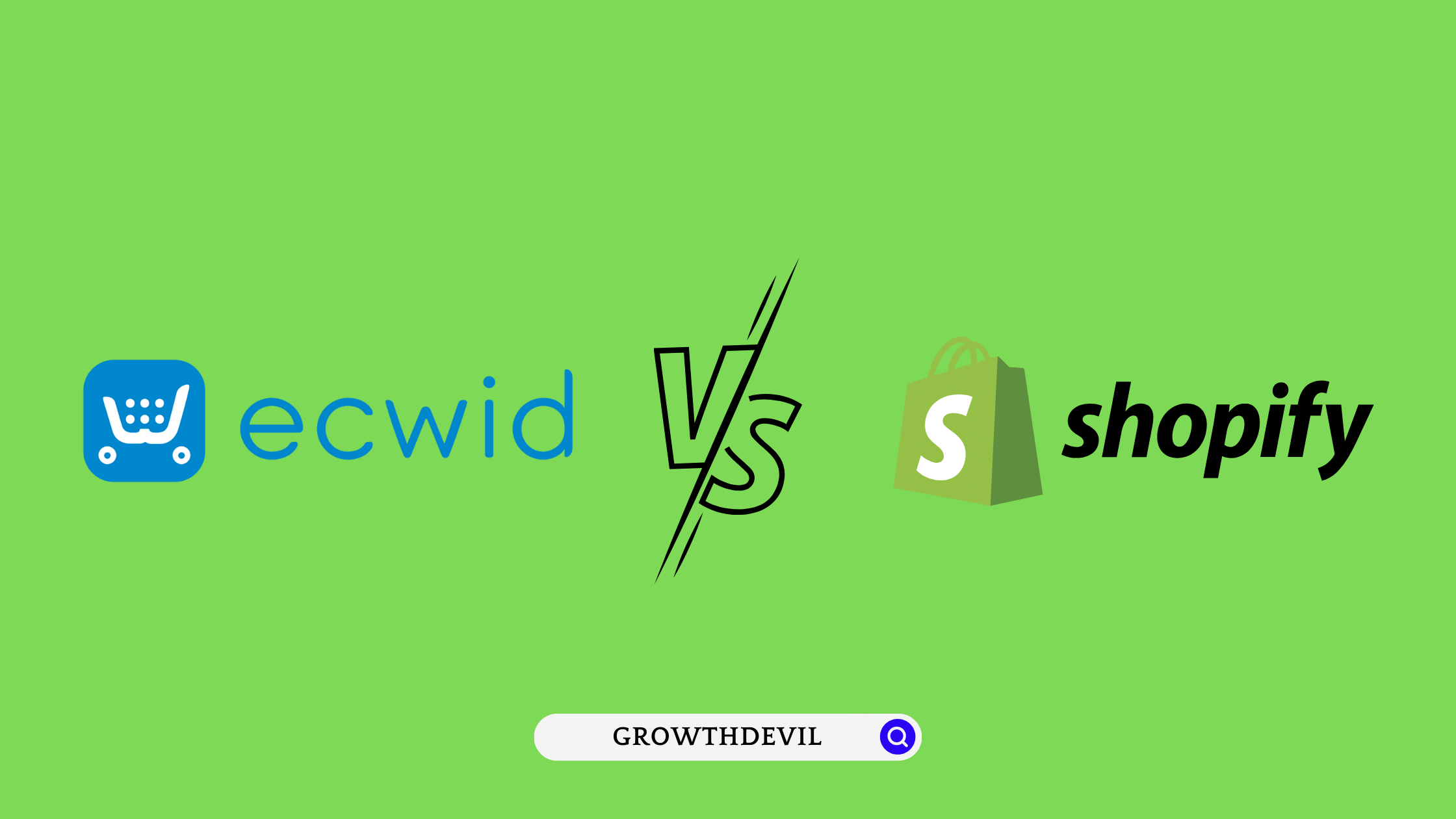If you plan to launch your online store, it is crucial to choose the right platform. Whenever we consider starting an online store, Shopify is the first name that comes to mind. We also have other platforms like Ecwid, which can be used as an alternative to Shopify.
While Shopify and Ecwid both appear similar, they serve different types of businesses. If you are unsure which one to use, this article on Shopify vs Ecwid can assist you in selecting the best platform to create the online store. At the end of the article, you will get a clear idea about which solution better suits your business in terms of features.
Ecwid vs Shopify: Key Differences (2024)
Here are the key differences between Ecwid and Shopify.
- Ecwid is more like a plugin that allows you to add eCommerce functionalities to your existing website, whereas Shopify is a complete eCommerce platform where you can create an online store from scratch.
- Shopify offers its own payment methods where you don’t have to pay transaction fees, whereas Ecwid does not have this feature.
- There is no point-of-sale service available on Ecwid, whereas Shopify offers dedicated POS software to help you sell offline and online together.
- You can easily sell digital products using Ecwid, whereas, on Shopify, you need to download the “Digital Downloads” app to sell digital products on your store.
Ecwid vs Shopify: In Nutshell
Ecwid and Shopify are reliable online store builders that are employed in different circumstances. With Shopify, you can build a full-featured, scalable online store. Ecwid, on the other hand, is perfect for those who are just starting with new eCommerce stores. You do not need any technical knowledge to build and operate either platform.
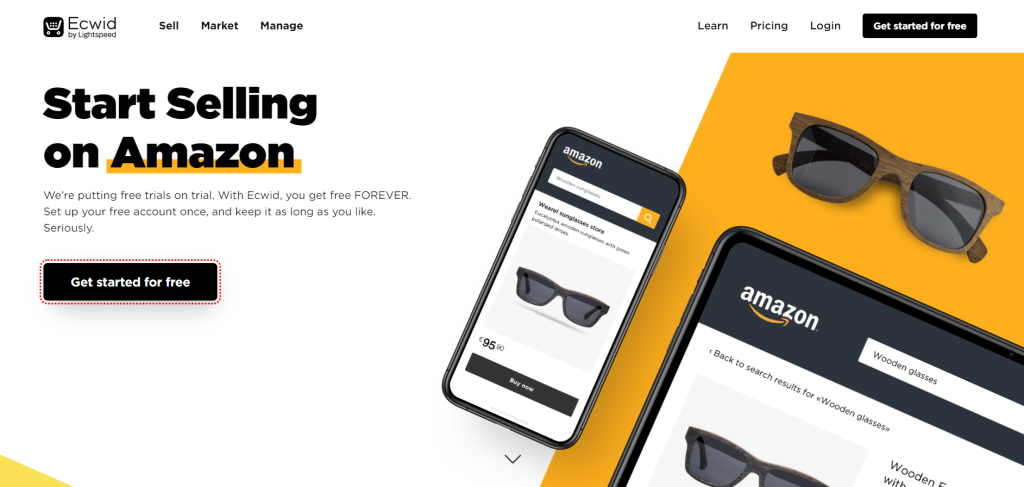
Shopify provides all of the eCommerce functionality inbuilt and only lets you sell through their website. Whereas Ecwid does not come with all the advanced features, it lets you sell through different platforms like Wix, WordPress, etc. The best thing about Ecwid is that it provides free and reasonable pricing plans.
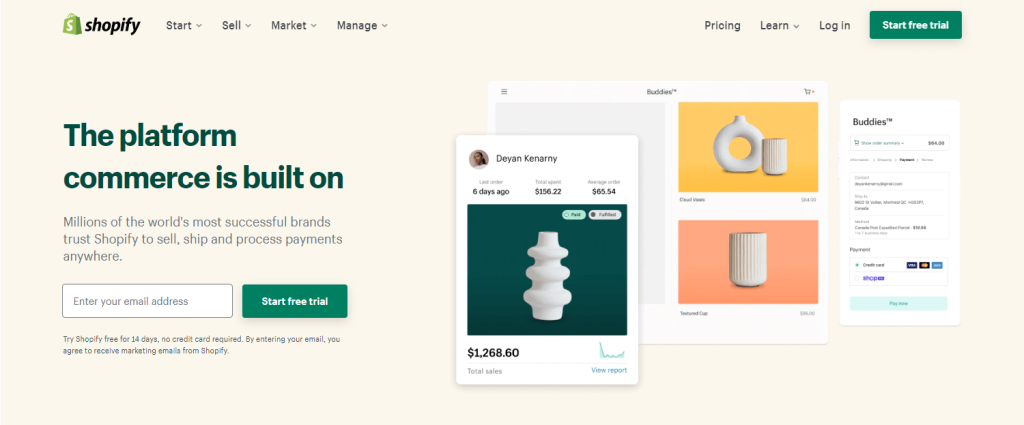
Comparison table of Ecwid vs Shopify
| Features | Ecwid | Shopify |
| Ease of Use | Easy | Easy |
| Pricing | Reasonable pricing | Pricing is fair for given features. |
| Inbuilt features | less | More |
| Marketing features | less than Shopify | More |
| Integrations | less | more |
| Payment Gateway | available | available |
| Multi-language | 50 languages | 20 languages |
| Multi-Currency | 130 currencies | 130currencies |
| Dropshipping | Less apps | More apps |
| Customer support | Live chat and Email | Live chat, Email and Call |
Which is Easier To Use, Ecwid or Shopify?
Ecwid and Shopify platforms are easy to use and do not require any technical expertise to operate.
Creating an Account
Both platforms allow you to create an account in just a few simple steps. They require you to fill in the necessary information to help set up your account.
Designing website
Ecwid and Shopify dashboards have a similar interface, making them easy to navigate.
After signing up, you can design your website with free or paid themes available on Shopify. To customize the website’s theme to an advanced level, you must know how to code or hire a web designer.
When it comes to Ecwid, you have the option to design using CSS code, a Sign panel, an App marketplace, and CMSs like WordPress, Wix, etc.
Adding Products
Both Shopify and Ecwid come in handy to add products. You can upload the product’s photo online, add all the necessary information, and start selling after making the necessary settings.
Shipping Settings
After adding products, you can just navigate to shipping in Ecwid and for Shopify, go to Settings > Shipping and delivery. Make the necessary setting to which part of the world you want to sell your products.
Payment Gateways Settings
Ecwid and Shopify make it simple to configure payment gateways. You should go to Shopify settings > payments and turn on the payment gateways you want to accept from your clients. Likewise, in Ecwid, go to payments and turn on all the payment gateways you want to accept from your clients.
Ecwid Dashboard
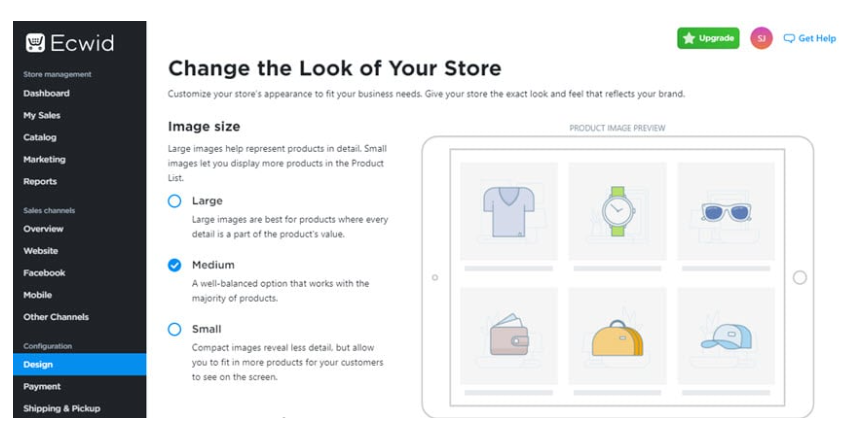
Shopify Dashboard
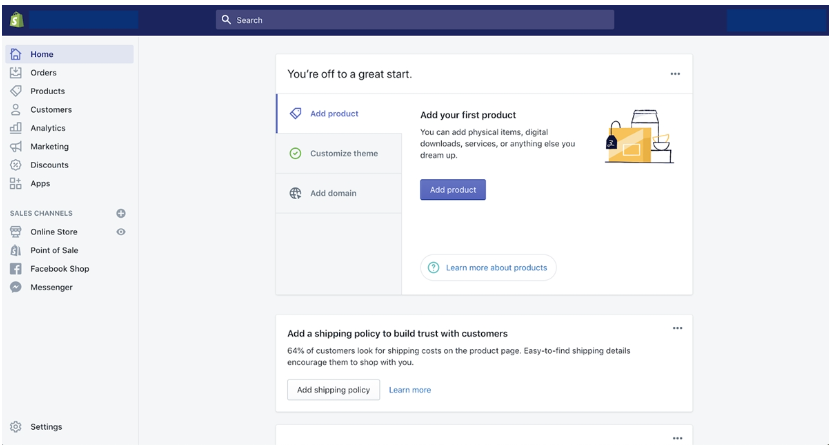
Ease of use Verdict: There are a few differences between Shopify and Ecwid regarding user experience. Making advanced customizations to the online store can be challenging for someone without programming language knowledge. Ecwid is, therefore, easier to use than Shopify because it offers more options for website customization.
Ecwid vs Shopify-Which One Has Reasonable Pricing?
Pricing is the base factor when choosing an online store builder. Let’s get into the pricing section of each platform:
Ecwid Pricing:
There are four different pricing plans available for Ecwid. Depending on the country, Ecwid has varied fees. Only US price is represented in the table below. Ecwid charges more to customers outside of the USA.
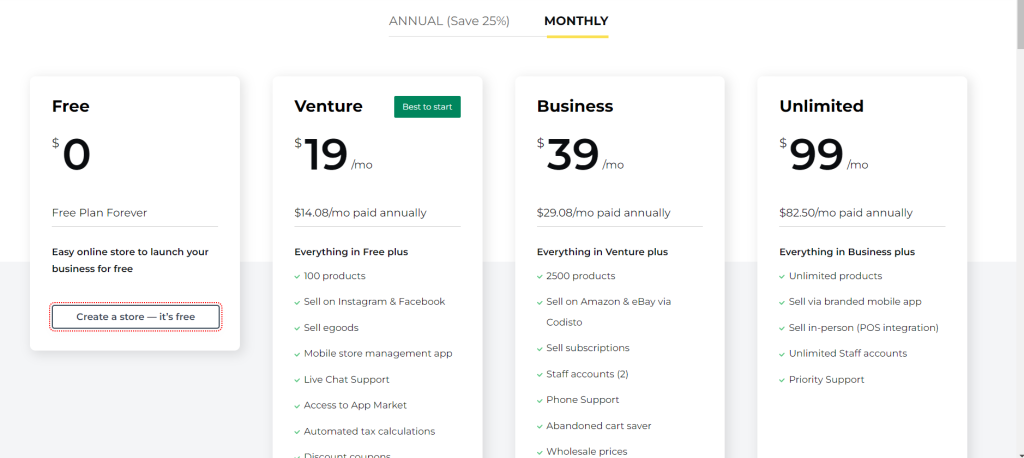
| S.No | Ecwid plans | Pricing |
| 1 | Free | $0/mon |
| 2 | Venture | $19/mon |
| 3 | Business | $39/mon |
| 4 | Unlimited | $99/mon |
Shopify Pricing:
Shopify has total 5 pricing plans in they are listed below:
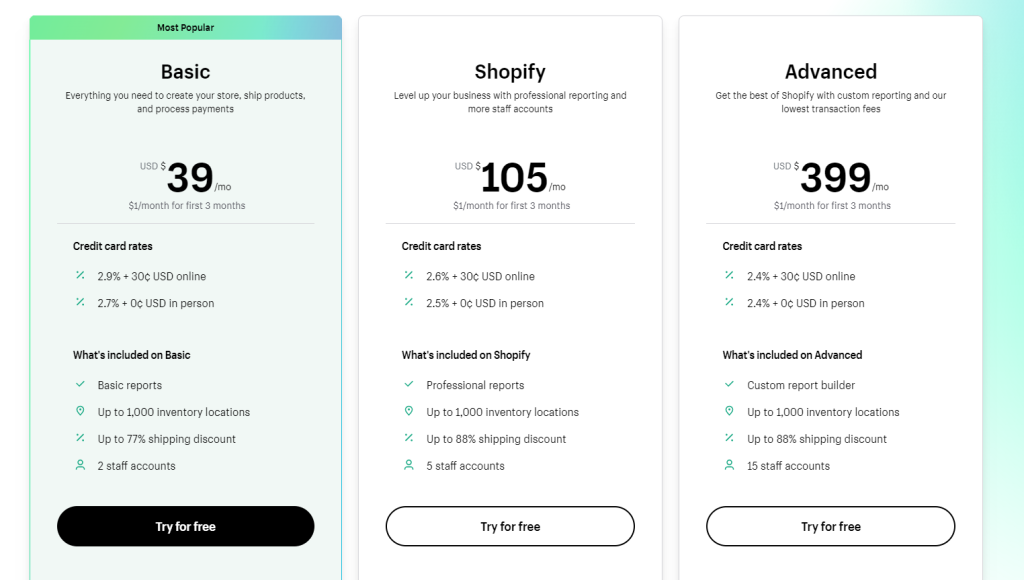
| S.No | Shopify Plans | Pricing |
| 1 | Basic | $39/mon |
| 2 | Standard | $105/mon |
| 3 | Advanced | $399/mon |
| 4 | Shopify lite | $9/mon |
| 5 | Shopify Plus | $2000/mon |
Pricing Verdict:
Shopify offers essential eCommerce features for a standard price. Ecwid is the best choice if you want to build an online store with affordable pricing. Both platforms are efficient in serving specific customers. My favorite part about Ecwid is their lifetime free plan.
Which Platform Has Great Inbuilt Features?- Ecwid vs Shopify
| Features | Shopify | Ecwid |
| Point of Sale(POS) | Yes | Yes |
| Number of products | Unlimited | Limited |
| Product options | Available | Available |
| Product categories | Available | Not Available |
| Digital products | Available | Available |
| Abandoned cart recovery | Available | Available(only in 2 plans) |
| Real-Time Carrier Shipping rates | Available | Available |
| Custom Shipping Rules | Available(with 3rd party apps) | Available |
| Automatic tax calculation | Available | Available |
| Embedding products on other sites | Not Available | Available |
| Analytics and Reporting tools | Available | Available(Using third party apps) |
1. Point Of Sale
Point of sale allows you to sell products other than an online store like brick-and-mortar stores, flash sales, etc. It allows you to accept payment in person and online.
In Ecwid, you must choose third-party services like Square, Clover, Vend, and Alice. These platforms add the capability of selling through POS. You can use POS on only an unlimited plan with Ecwid, and it does not support all countries.
Whereas with Shopify, setting up POS is much easier. You can order POS hardware from Shopify online. Only residents of Australia, Belgium, Canada, Denmark, Germany, Ireland, Italy, Netherlands, New Zealand, Singapore, Spain, the UK, and the US are eligible to place orders for POS. If you do not stay in these countries, you should find an authorized reseller and purchase the POS hardware. In this way, Shopify POS functions.
2. Number of Products
With Shopify, you sell unlimited products in every plan. In comparison, Ecwid restricts the number of products you sell in each plan except in unlimited plans. You can sell up to ten products in the free plan, 100 products with the venture, and 2500 products with the business plan.
3. Product options
Ecwid offers in-depth features for product options like adding checkboxes, Radio buttons, Date pickers, text fields, etc. All these options are available in free and paid plans. Whereas for Shopify, you need to pay extra fees for each functionality for third-party integrations.
4. Product categories:
You can automatically and manually categorize each product with different criteria in Shopify. It is extremely useful for stores that sell a huge number of products. Since Ecwid limits the number of products compared to Shopify, it does not offer product categories.
5. Digital Products
Shopify and Ecwid allow you to sell digital products in online stores like courses, ebooks, music, photography, digital art, etc. With Shopify, you can sell digital products in all the plans, whereas Ecwid free plan doesn’t allow digital products. You cannot sell digital products using free plans, you need to upgrade the plan.
6. Abandoned Cart Recovery
Abandoned Cart Recovery can be a life-saving feature for eCommerce store owners. When visitors add the product to the cart and leave the store without buying it, they will get a reminder through emails.
Shopify and Ecwid provide abandoned cart recovery functionality, but Shopify includes this in every plan. Whereas, Ecwid users only get this feature with business and unlimited plans. Ecwid uses AMP format emails for Abandoned Cart Recovery, which is unique and engaging to attract customers.
7. Real-Time Carrier Shipping rates and Shipping Rules
Shopify offers real-time carrier shipping rates to five carriers, such as USPS, UPS, DHL, Canada Post, and Sendle. If you want to use carriers other than these, you should use third-party shipping solutions like Shipstation, MCSL, etc. With Shopify’s inbuilt shipping functionality, you can deliver products to the US, Canada, and Australia.
The settings to enable real-time shipping rates for Shopify are
Settings > Shipping and delivery > shipping profile > tap Manage > Add rate > Select Use carrier or app to calculate rates.
Ecwid inbuilt real-time shipping rates for nine carriers. Ecwid real-time shipping rates carriers are UPS, USPS, FedEx, Canada Post, Royal Mail, Brasil Correios, MDS Collivery, Australia Post, and EMS Russian Post.
Enabling real-time shipping rates requires the following setting:
Ecwid admin> Shipping & Pickup> Add Shipping Method> Select the carrier company > Click Set up
Ecwid allows you to set up five types of shipping methods. They are free shipping,
charging exact shipping costs, Flat-rate shipping, Custom rates, and Local pickup. Hence It allows you to set the custom rates based on subtotals or order weight.
Whereas Shopify allows you to set up flat shipping rates, Mark up or discount calculated rates, and offer free shipping rates. If you want custom rules, you should use third-party apps to create the custom rules according to your requirements.
8. Automatic tax Calculation
Automatic tax calculation is a must-have functionality in every eCommerce store. Both Shopify and Ecwid provide automatic tax calculation functionality. It allows you to charge the taxes in the checkout after automatically detecting the location of the visitors. Automatic tax calculation applies to both physical and digital products.
9. Embedding products on other sites
Ecwid allows you to sell on other platforms, including WordPress, Wix, Weebly, or any other partner website. You can also sell products through social media platforms. In addition, you can search for products, sell in multiple currencies, filter categories, and sort products.
While with Shopify, you can add buy buttons and shopping carts to the existing website. Also, Shopify buy buttons do not provide multicurrency selling options.
If you want to sell products on different platforms with multicurrency functionality, Ecwid can be the go-to option.
10. Analytics and Reporting tools
It is important to have analytics features in the online store to track the insights and records of the online store. Shopify and Ecwid both have the functionality of the Analytics feature.
With Shopify, you get inbuilt analytics and reporting tools like recent activity, visitors, store speed, and store transactions. Analytical pages, Finance reports, and Product analytics are available for the Shopify Lite plan. For upgraded plans, you get advanced features like Acquisition reports, Inventory, Behavior, Marketing, Sales report, etc.
Ecwid provides Analytics and Reporting tools through third-party apps, which come in free and paid versions. Some apps used for Analytics and Reporting in Ecwid are Convead: Marketing Automation and Analytics, Kliken Stats, Hubspot via Zapier, Lucky orange, etc.
Both Shopify and Ecwid offer Analytics and Reporting tools, but Shopify covers most of the essential analytics tools in their built-in feature.
Ecwid vs Shopify: Which one has better Marketing Features?
SEO
SEO is the main factor to consider if you want to prioritize on organic marketing. Shopify excels at SEO for features like AMP optimization, customized URLs, and website speed. Even though factors might feel small but have an impact on organic growth. Ecwid does not give you full control over URLs. Although Ecwid’s premium subscriptions are capable of some of these features, Shopify makes them seamless.
Email Marketing feature–
Email marketing can increase sales using product recommendations, sale season, holidays, discounts, etc. Shopify has an inbuilt email marketing feature where you can design branded emails, use templates, automate emails, run campaigns, etc. Email marketing is free until you use 10,000 emails per month. After that, you should pay $1 per 1,000 additional emails sent, which is affordable.
When it comes to Ecwid, they do not have an email marketing feature, but they have integration with Mailchimp, where you can start with the free plan. When the number of customers increases, you need to switch to a paid plan.
Blogging
Ecwid does not offer blogging functionality, but integrating with CMS like WordPress or Wix can create a great blog section. Another alternative is possible by adding a category in the catalog section. It might not be so effective for organic results, but if you want to have one, it does your job.
Shopify offers an inbuilt blogging feature in all their plans. They offer standard blogging features that can convert visitors to customers. Even though they do not provide advanced features, having a credible blog section on the website is still beneficial.
Ecwid vs Shopify Integrations
Sometimes, eCommerce stores require extra features that Shopify can not provide. Hence third-party integrations are necessary. Let’s see which platform has the best integrations.
Shopify offers more than 6,000 app integrations from its app store for every functionality. They have dedicated search sections like Marketing, Store design, Conversation, Fulfillment, Store management, Customer service, Shipping, and Delivery.
Shopify app store
Ecwid also has its app store. However, it does not have as many options as Shopify. But, they provide the apps required to run the essential eCommerce business. A few app areas are marketing, store design, dropshipping, shipping accounting, analytics, and reporting. Even though Ecwid doesn’t offer as many apps as Shopify, you can still obtain integrations for Ecwid using any automated solutions.
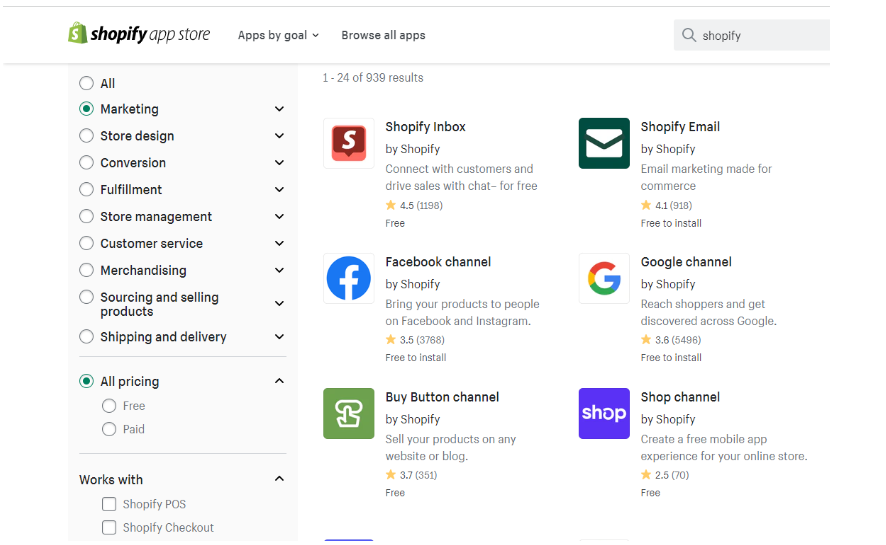
Ecwid app store
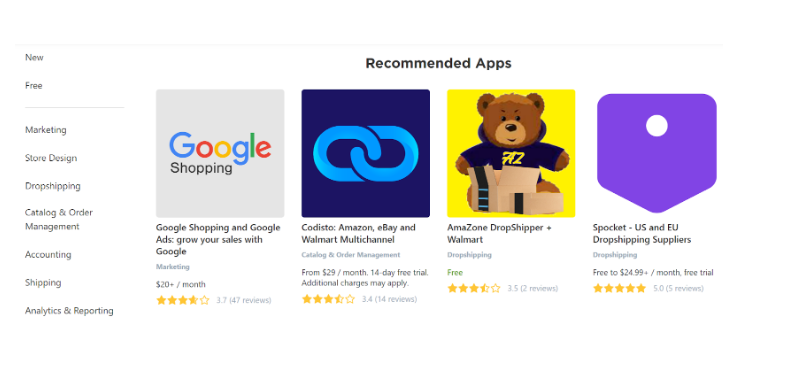
Integrations verdict
Both Ecwid and Shopify provide the necessary apps for integration. However, Ecwid cannot compete with Shopify because its app store does not cover all app categories.
Ecwid vs Shopify Payment Gateways and Transaction Fee
Payment gateways are necessary to accept customers’ payments. Therefore, you must integrate your payment channels into the online store. There are multiple payment gateways available in the market that support Ecwid and Shopify.
Shopify provides more than 100 payment gateways to integrate with your online store. Shopify Payments, Stripe, PayPal, WorldPay, Authorize.Net, Amazon Pay, Square, Braintree, 2Checkout, Adyen, PayFast, and PayGate, are a few. Shopify imposes a transaction fee of 2.9% + $0.30, except for Shopify payments. However, Shopify payment doesn’t support every country. If it supports your country, you can use it. Also, the transaction fee gets lowered upon upgrading the Shopify plans.
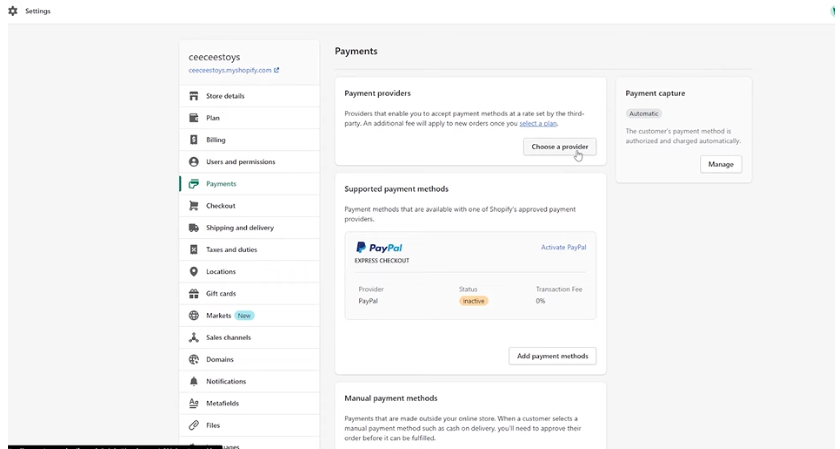
Shopify payment gateway setting image: Ecwid has over 100 pre-integrated payment gateways to connect to your online store. They are PayPal, Stripe, Square, Klarna, PayU, Afterpay, and Wepay.
On top of that, Ecwid does not charge a transaction fee for using third-party payment gateways.
Verdict for Payment Gateways and Transaction Fee
Both Shopify and Ecwid have integrated third-party payment gateways. When it comes to transaction fees, Shopify’s transaction charges are a bit higher, whereas Ecwid does not charge any transaction fee. So Ecwid is best in terms of Payment gateway and Transaction Fee. Ecwid does not charge any transaction fee. So Ecwid is best in terms of Payment gateway and Transaction Fee.
Ecwid payment gateway setting image
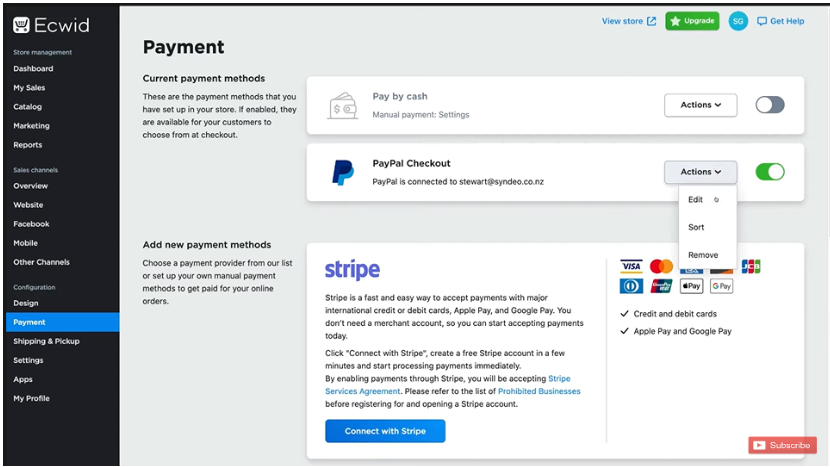
Ecwid vs Shopify- Multi-Language Selling & Multicurrency Selling
Multi-language Selling & Multicurrency Selling is essential when you want to sell in more countries. It allows you to sell the products in the customer’s native language and currency.
When it comes to Ecwid, they offer Seller control panels in 20 different languages. Also, the storefront can translate into 50 languages according to your customer’s location and browser settings. Another benefit of Ecwid is it translates the email sent to upto 12 languages according to your customer’s location. Again this also depends on their customers’ browser settings.
Ecwid allows you to sell in different currencies using third-party apps like the Currency Converter and Auto Currency Switcher apps. They display pricing in around 130 currencies on your storefront. At the checkout, Ecwid displays the amount in the store’s original currency.
Whereas with Shopify, you can have your store in 20 languages with the Markets feature. When you want to send emails in different languages, they should be translated manually, and sometimes it is not possible due to themes restriction.
Shopify offers an automatic currency converter for only the Shopify Plus plan. If you want to use the muti-currency feature in basic and standard plans, you must use third-party apps like Currency Converter. It allows you to sell in 130 different currencies. At the checkout, Shopify displays the amount in the customer’s currency.
Verdict for Multi-language Selling & Muticurrency Selling: In terms of Multi-language, Ecwid provides more language options than Shopify. Both allow multi-currency feature using third-party apps upto 120 languages. Besides displaying prices in multicurrency, Shopify allows your customers to purchase in the currency of their choice.
Ecwid vs Shopify- Which Platform Excels In Dropshipping?
Both Ecwid and Shopify allow dropshipping functionalities. You need to have a third-party app to integrate with your online store. They help you to connect with dropshipping suppliers and find suitable products to sell in your store.
Ecwid provides free and paid apps to connect with dropshipping suppliers. Some of them are Amazone DropShipper, Spocket, Syncee, Wholesale2b, Printful, XCatalog, etc.
Shopify provides paid and free solutions such as DSers, Spocket, DSM – AliExpress Dropshipping, Zendrop – Global Dropshipping, Trends – Fashion Dropshipping, Ali Orders – AliExpress Dropship, etc.
Verdict for Dropshipping options: Both platforms support dropshipping, but Shopify has a greater selection of third-party dropshipping apps than Ecwid.
Ecwid vs Shopify Customer Support
Customer support is the main point of contact whenever there is a problem with the platform’s operations. Ecwid and Shopify both provide customer support.
Shopify provides customer assistance for its basic, standard, and advanced plans via phone calls, emails, and live chat. Shopify Lite will also receive support except for phone help. They also have many resources to assist users, including blogs, manuals, and communities.
Ecwid provides customer support 24/5 through email and lives chats. But phone call support is available for only business and unlimited plans. They also have online resources to help their customers.
Verdict for customer support: When it comes to supporting, Shopify wins because it provides phone call support for all the plans except one. They also have other resources like the community to ask any queries.
Key Highlights of Shopify and Ecwid
There are several key highlights to choosing both platforms. They both provide value to customers with their unique features.
Advantages of Shopify over Ecwid
- You get all the necessary eCommerce features inbuilt, and there is no need to go for third-party apps.
- Shopify provides more sophisticated SEO functionality than Ecwid.
- There is no limit on the number of products you sell.
- There is an app for every need in the Shopify app store.
- Shopify’s multicurrency feature allows customers to check out the amount in their currency, unlike Ecwid.
- Shopify comes with reasonable pricing with all the eCommerce and marketing functionality.
- Shopify offers more dropshipping apps both in free and paid versions
- Shopify provides great customer support to their customers
Advantages of Ecwid over Shopify
- They offer a free plan, which includes essential features.
- There is no transaction fee for third-party payment gateways.
- They provide multi-language selling functionality in upto more than 50 languages.
- They allow you to sell in different marketplaces like WordPress, Wix, Facebook, Instagram, etc.
- They provide more carrier integrations and do not require a third-party shipping app.
- The product size limit is more for Digital products in Ecwid
- They have extreme product options, unlike Shopify.
Related Read:
- Shopify vs Amazon
- WooCommerce vs Shopify
- Bigcommerce Vs Shopify
- Shopify Vs Squarespace
- Wix vs Shopify
Conclusion: Ecwid vs Shopify (2024)
Shopify and Ecwid provide great features with reasonable pricing, but they cater to different customers. Ecwid is most suitable for small and medium-sized businesses. At the same time, Shopify is perfect for medium and large-sized established businesses. Ecwid provides powerful features with the free plan, which can be most useful for people who want to start an eCommerce business for free. In this detailed comparison of Ecwid vs Shopify, I hope my article has helped you get a clear picture of both platforms and decide on the best platform per your needs.
- 12 Best Dropshipping Stores For Sale (2024 Picks) - April 18, 2024
- Helium 10 Coupon Code & Discount 2024 – 35% OFF (April) - April 11, 2024
- When Does Amazon Stop Delivering (Updated 2024) - April 9, 2024

